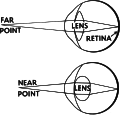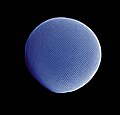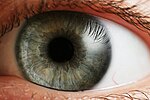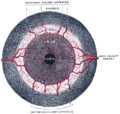Accommodation is the process by which the vertebrate eye changes optical power to maintain a clear image or focus on an object as its distance varies....
38 KB (4,664 words) - 20:36, 26 June 2024
to 10 dioptres and accommodation continues to decline with age. The lens is located towards the front part of the vertebrate eye called the anterior...
52 KB (6,471 words) - 13:51, 26 June 2024
labelled Accommodation (vertebrate eye) (focusing) Adaptation (eye) (night vision) Capsule of lens Cornea Emission theory (vision) Eye color Eye development...
60 KB (7,519 words) - 16:26, 5 June 2024
Scleral Ring (redirect from Eye bone)
Museum, London. Retrieved 15 October 2013. Walls, Gordon L. (1942). The vertebrate eye and its adaptive radiation [by] Gordon Lynn Walls. Bloomfield Hills...
8 KB (895 words) - 02:52, 2 March 2024
Pupil (redirect from Pupil (eye))
doi:10.1167/9.3.27. PMID 19757966. Walls, G.L. (1967) [1942]. The vertebrate eye and its adaptive radiation. Cranbrook Institute of Science Bulletin...
24 KB (2,817 words) - 11:46, 17 April 2024
Chameleon vision (category Vertebrate anatomy)
chameleon eye allow for accurate focusing by corneal accommodation. Using corneal accommodation for depth perception makes the chameleon the only vertebrate to...
11 KB (1,348 words) - 17:50, 24 June 2024
Iris (anatomy) (redirect from Iris of the eye)
The iris (pl.: irides or irises) is a thin, annular structure in the eye in most mammals and birds, responsible for controlling the diameter and size...
20 KB (2,340 words) - 18:52, 1 May 2024
Depth perception (section Accommodation)
dimensions. Depth perception happens primarily due to stereopsis and accommodation of the eye. Depth sensation is the corresponding term for non-human animals...
39 KB (5,089 words) - 14:49, 11 May 2024
the other eye is open, the pupil of the first eye is small; when the other eye is closed, the pupil of the first eye is large. Accommodation and vergence...
27 KB (3,685 words) - 11:56, 26 April 2024
Lamprey (category Parasitic vertebrates)
lampreys are well developed. Accommodation is done by flattening the cornea, which pushes the lens towards the retina. The eye of family Mordaciidae possess...
84 KB (8,893 words) - 07:07, 3 July 2024
Vision in fish (redirect from Accommodation in fish)
oxygenated blood to ensure optimal performance. Accommodation is the process by which the vertebrate eye adjusts focus on an object as it moves closer or...
66 KB (7,912 words) - 15:28, 23 March 2024
vision in the visual cortex. Primates and many other vertebrates use three types of voluntary eye movement to track objects of interest: smooth pursuit...
29 KB (3,658 words) - 16:44, 28 April 2024
Bird vision (redirect from Bird eye)
that of other vertebrate groups; a pigeon has been described as "two eyes with wings". Birds are theropod dinosaurs, and the avian eye resembles that...
68 KB (8,330 words) - 20:56, 12 May 2024
Bates method (section Accommodation)
misleadingly". Accommodation is the process by which the vertebrate eye adjusts optical power to maintain focus on the retina while the eye's gaze shifts...
45 KB (4,728 words) - 04:46, 14 May 2024
Cornea (category Human eye anatomy)
LASIK. While the cornea contributes most of the eye's focusing power, its focus is fixed. Accommodation (the refocusing of light to better view near objects)...
28 KB (3,329 words) - 03:03, 24 June 2024
Learning. Link (1998). "Evolution of colour vision in vertebrates". Eye. 12 (3): 541–547. doi:10.1038/eye.1998.143. PMID 9775215. "Circadian Rhythm and Human...
47 KB (5,790 words) - 11:44, 26 April 2024
Myopia (category Disorders of ocular muscles, binocular movement, accommodation and refraction)
illumination and vision range, or the eye is modified with artificial lenses or deprived of clear form vision. In lower vertebrates, this kind of myopia seems to...
88 KB (9,264 words) - 10:05, 24 June 2024
Pretectal area (section Accommodation reflex)
pretectum, particularly the NOT and NPP, are implicated in the accommodation reflex by which the eye maintains focus. Proprioceptive information from the retina...
19 KB (2,168 words) - 22:39, 30 May 2024
Visual system (section Eye)
Nuclei of the optic tract are involved in smooth pursuit eye movement and the accommodation reflex, as well as REM. The suprachiasmatic nucleus is the...
58 KB (6,877 words) - 20:38, 13 May 2024
control eye movement in general. Cortical control of eye movement (saccades, smooth pursuit, accommodation) involves conjugate gaze, not unilateral eye movement...
15 KB (1,751 words) - 20:45, 4 May 2024
Capsule of lens (category Human eye anatomy)
The lens capsule is a component of the globe of the eye. It is a clear elastic basement membrane similar in composition to other basement membranes in...
15 KB (1,666 words) - 09:34, 10 May 2024
its function as a constrictor of the pupil. This structure is found in vertebrates and in some cephalopods.[citation needed] All the myocytes are of the...
5 KB (402 words) - 03:41, 30 May 2024
control eye movement in general. Cortical control of eye movement (saccades, smooth pursuit, accommodation) involves conjugate gaze, not unilateral eye movement...
14 KB (1,660 words) - 19:04, 1 January 2024
cephalopod eye fundamentally differ from those of vertebrates such as humans. Superficial similarities between cephalopod and vertebrate eyes are thought...
56 KB (6,181 words) - 03:02, 4 July 2024
or commonly referred to as the bony fish, is a diverse superclass of vertebrate animals that have endoskeletons primarily composed of bone tissue. They...
32 KB (2,205 words) - 14:18, 29 May 2024
for accommodation) and the iris sphincter muscle, which is responsible for miosis or constriction of the pupil (in response to light or accommodation)....
31 KB (3,906 words) - 16:06, 1 March 2024
of normal – or relatively well-preserved – vision. Every normal mammalian eye has a scotoma in its field of vision, usually termed its blind spot. This...
11 KB (1,408 words) - 05:28, 5 December 2023
It typically affects both eyes, as it is not a problem specific to one eye. The affected area flickers but is not dark. It then gradually expands outward...
14 KB (1,311 words) - 07:42, 12 June 2024
Smooth (soft) muscle is one of the three major types of vertebrate muscle tissue, the other being skeletal and cardiac muscle. Nonetheless, it is found...
37 KB (4,738 words) - 19:39, 25 June 2024
Bowmaker, JK (1998). "Evolution of colour vision in vertebrates". Eye. 12 ( Pt 3b) (3): 541–7. doi:10.1038/eye.1998.143. PMID 9775215. Vorobyev, M (July 2004)...
16 KB (1,717 words) - 02:59, 17 May 2024



























